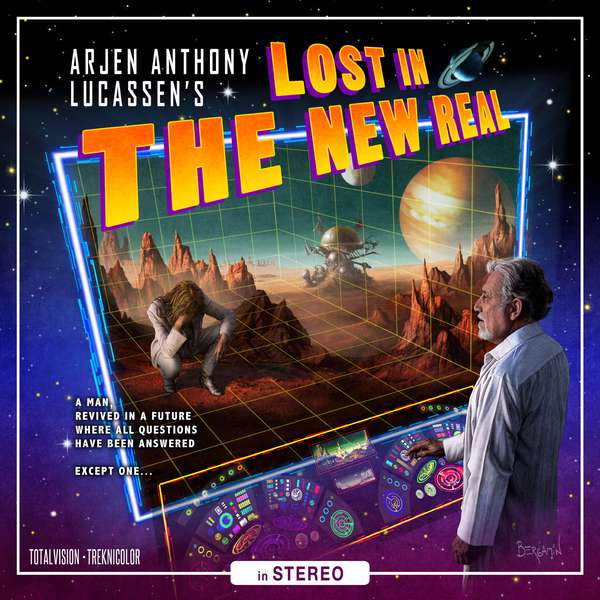Few musicians are quite as busy as the Dutch composer and multi-instrumentalist Arjen Anthony Lucassen. Though he's known principally for being the brain behind the immense collaborative project Ayreon, Lucassen has headed no less than four other bands, including progressive metal band Guilt Machine, ambient metal band Ambeon, space rock band Star One and the gothic/symphonic metal band Stream of Passion he created and left. Looking back on his career, it seems like the man's always had something to do and someone to perform with; it's hard to see how he'd find time to release a solo record with so many opportunities for collaboration available to him. And that's why his 2012 album Arjen Anthony Lucassen's Lost in the New Real is only the second in over thirty years of creating music to be released under his own name alone.
Lost in the New Real is a loose concept album over two discs. The first follows the thoughts of a man known simply as Mr. L who, after being cryogenically frozen to prevent his body from succumbing to an incurable disease, awakens several generations into the future. After being cured, he comes down with the world's worst case of culture shock, and the story follows how he deals with the progress and changes, for both better and worse, that humanity has made. To help him deal with being thrown without foothold into this vastly different reality, he is assigned a shrink named Voight Kampff, played by none other than actor Rutger Hauer. (Those of you more film literate than I have no doubt already picked up on the Blade Runner references that I had to discover on my own.) The second disc features songs that tie into Mr. L's story but couldn't quite be worked in chronologically, as well as a selection of classic rock covers that are tangentially related to the themes of the story.
There are many ways in which Lucassen has differentiated his solo work from his biggest project Ayreon, not the least of which is the fact that the album doesn't feature an ensemble roster of guest performers. It's just Lucassen and his studio band, which, admittedly, while large, is nowhere near the size of musicians that his collaborative projects normally accommodate. As such, rather than consisting of a rotating spotlight giving a multitude of musicians each an equal amount of attention, the songs are all focused directly on Lucassen and his unique instrumental talents. His singing voice in particular is vastly underappreciated, and given how little of it you actually hear on the albums he writes, it's a welcome occurrence to have him performing the vocals alone for once.
Well, I suppose I should qualify that last statement; each of the pieces on the first disc actually opens with some narration from Hauer, and let me tell you, his performance is nothing short of superb, to the point that he almost steals the show entirely from Lucassen. Going into this album, I was expecting his part to be a rehash or at least very similar to Terry Brown's performance as the hypnotherapist on Dream Theater's Metropolis, Pt. 2: Scenes from a Memory; thankfully, I was proven very wrong. Hauer's hauntingly minimalist and yet disturbingly expressive speeches simultaneously invoke senses of paternal comfort and the particular unease resulting from the uncanny valley, and there are definitely audible hints at Peter Daltrey's quite contemplative character Forever of the Stars from Into the Electric Castle.
Speaking of that album, given the subject matter here, Lost into the New Real naturally has a similar over-the-top space-opera feel. But instead of being influenced by B-grade science fiction, Lucassen's lyrics speak about topics and worries that are surprisingly modern, and often have a habit of hitting disconcertingly close to home. The Orwellian "E-Police", for example, feels unnervingly relevant today's conflicts of Internet piracy, especially given the attention received by the case of Megaupload and the recent push in the US for anti-piracy legislation. "Pink Beatles in a Purple Zeppelin" echoes the very strong and near universal feelings about the growing homogeneity of music with great precision, all the while mocking the listener with it's clearly derivative melodies. Even the otherwise fantastical "Yellowstone Memorial Day" has a way of presenting the present-day ecological issues in an unexpectedly and depressingly realistic manner.
A caveat on that last note: though the lyrics do have a habit of ringing true, they seem to do so at the expense of musicality. The lyrics on almost all of the original songs feel stilted and forced, and it often sounds as if shoehorning in the subject matter was more important than creating an appealing product. The chorus on "Parental Procreation Permit" stands out for having some absolutely atrocious rhyming in its chorus, "Where Pigs Fly" is almost insulting with its insipidness of its lyrics, and "E-Police" seemingly just abandons any sense of lyrical construction. And this isn't me being needlessly picky, mind you; I frankly only pay minimal attention to the lyrics most of the time. The fact is that they can be so laughably terrible on this album that I can't not notice them.
Speaking of songs with actually good lyrics, the cover songs Lucassen has recorded are surprisingly satisfying. Lucassen's machinistic and dystopian takes on these classic songs are actually very mature and impeccably executed, no doubt a result of his reverence for his forebearers. "Welcome to the Machine" deserves to be singled out for it's drastically original spin on the song, taking the original synth-driven lament and turning it into a forceful industrial attack. His duet with Elvya Dulcimer on Led Zeppelin's "Battle of Evermone" is also rather striking and admirably done, and Gjalt Lucassen's megaphoned screaming on Frank Zappa's "I'm the Slime" gives the song an incredibly fresh twist.
Signaled by his choice of bands to cover, Lost in the New Real features a return to Lucaseen's classic psychedelic rock sound that has been long absent since the 1990s; only his first solo album and his side project Strange Hobby have featured a similar sound. The change may be somewhat shocking for fans introduced to Lucassen through his much heavier metal work with Ayreon or Guilt Machine; though it has metal elements, this album is firmly and unquestionably rooted in good old classic rock. Anyone listening to this album will clearly hear that Lucassen greatly adores 1960s psychedelic music ("Pink Beatles in a Purple Zeppelin" is about as unambiguous a declaration of love as you could hope to ask for short of a proposal). There's also a related and very heavy folk rock influence at work, which isn't surprising, given how closely related it is to psychedelic music from that era. Flutes, strings, and even dulcimer make numerous appearances, giving the album a decidedly ecelctic aesthetic overall. The songs also all tend to follow clearly folk-based melodies, focusing on soft guitar leads and simple versechorus structures, as well as keeping far away from any amelodic tendencies.
Though they are enjoyable, I will say that the psychedelic and folk elements do sound incredibly out of place against the futuristic sci-fi backdrop, the latter in particular. Granted, in moderation, it's actually a very neat effect; juxtaposing the futuristic with the seemingly primitive creates a very distinct sense of temporal confusion that, when used effectively, can simultaneously impinge familiarity and unease in the listener. However, you can only stretch its use so far before the willing suspension of disbelief gives out, and when that happens on this album, the end result just winds up sounding silly.
The big thing that is holding this album back, however, is that it really sounds like Lucassen is overcompensating. Throughout the entire album, it sounds like he's trying to prove that he can do it all on his own, that he doesn't need a vast roster of guest musicians to back him up, and to do it, he's pulling out all of the stops he can find, with a questionable degree of success. The album is two discs long when it really only has enough original material to fill one (the original songs on the second disc are throwaways in comparison to the first), the songwriting sounds like he's stretching entirely too far for something to be inspired by, and the album generally relies on his same tried-and-true methods of composition that have been heard on every Ayreon album to date. It's not so much a grand statement of his independence as much as it is a confirmation of his reliance on what has now become his established sound.
Don't get me wrong, it's not necessarily a bad album; it just doesn't seem like it lives up to all of the expectations that surround it's creator. After all, this is the artist that gave us classic pieces like Into the Electric Castle and Universal Migrator, albums which are considered to be among the best in modern progressive music. It's just a bit of a letdown to hear a man with such creative genius struggle so hard to live up to his own ridiculous standards to the point where it almost seems as if he's running dry. I don't think that's what's happening here, but Lucassen isn't making a good case otherwise.
Fans of his work will find nothing new on Lost in the New Real, but are likely to find the familiar writing and style to be an enjoyable excursion nonetheless. Those unfamiliar with his music will find that this album is a solid introduction to his sound, and can act as a good stepping stone to set up some of his better albums.
Now that I think about it, that was a really long and roundabout way to get to the conclusion that this album is fairly average.




